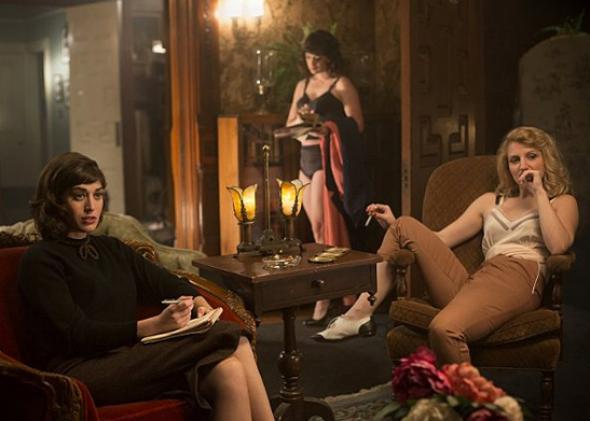Shortly after we meet William Masters (Michael Sheen), one half of the pioneering, real-life sex-research team in Showtime’s Masters of Sex, he is feverishly staring through a peephole at a prostitute who’s faking it, timing her orgasm in the dark. Masters of Sex, which premieres Sunday night, is a gorgeous period drama that swiftly establishes its risqué themes. But unlike the serious and handsome premium cable series that it resembles, its star is not some ladykilling protagonist. There he is, face pressed up to the wall, believing that he’s watching this woman for the purposes of edification, not titillation. (William Masters watches copulation the way we watch serious and handsome premium cable dramas.)
Masters of Sex is the best new show of the fall season by the length of all the dildos in Masters’ research lab. It belongs to a cohort of shows—among them Orange Is the New Black, The Americans, and Top of the Lake—that noodle on the themes that have so far defined the golden age of TV (masculinity, power, ethics), but with a bunch of new licks. Masters of Sex is about a difficult man, but one who makes babies, not corpses; he’s an academic, not an antihero. An expert obstetrician so driven to study sex he’s gathering data in whorehouses, he has all the sexual swagger of one of Don Draper’s chest hairs, with half the kink. Over french fries, the prostitute explains to Masters that she was faking it, and he is shocked: Why would a woman ever do that? The woman who elucidates this mystery for him is Virginia Johnson (Lizzy Caplan), a former nightclub singer and single mother, who is as scholarly about pleasure as Masters is about biology—and Masters knows enough to respect this other body of knowledge. They team up to change the world.
Created by Michelle Ashford and based on a nonfiction book of the same name, Masters of Sex chronicles the personal lives of Masters and Johnson as they move their studies from the whorehouse to the hospital to the cover of Time magazine. The show is set in 1956, before the sexual revolution, but Masters of Sex is never condescending about the past. This is another contrast with Mad Men: Think of the infamous scene in which Don and Betty have a bucolic picnic and then leave all their trash behind, inviting us to pooh-pooh customs before environmentalism. Masters of Sex doesn’t pooh-pooh, it sympathizes, even with the most sexually clueless.
Yes, in 1956 some women didn’t know what an orgasm was, a young married couple might hope to make a baby by literally sleeping next to each other, and clitorises were disrespected. But Masters and Johnson still convinced an array of willing subjects to strap on wires and masturbate and fornicate in front of them, often utilizing a giant glass dildo in the name of science. The Internet did not invent exhibitionists. What Masters and Johnson changed is not how people had sex, but what they knew about sex, what they thought about sex, and where they could talk about sex—which then changed how people had sex.
Yet Masters of Sex is interested in sex as a personal as well as a social phenomenon. In the early episodes, Masters and Johnson are set up as opposites, and any Paula Abdul fan can guess what will happen next. (If you’re not into spoilers, don’t look at their Wikipedia page.) At the start, Masters is sexually shut down, while Johnson is a sexual genius; he’s married, she’s twice divorced; he’s cold, she’s warm; he knows science, she knows people. Needless to say, the robotic Masters does not come off well initially, but over the course of the first six episodes, Sheen’s character develops in interesting ways. Caplan gets stuck playing likable.
Masters asks strangers for their sexual history, but barely wants to touch his wife, Libby (Caitlin Fitzgerald). He lies to her about why they are having so much trouble conceiving, even as he speaks passionately about the confused, frightened, sure-they-are-frigid women who come to his office just looking for more information. Slowly, as Sheen cracks open, we see a little perviness under the propriety, and recognize that Masters’ passion for his studies has as much do with sex as with science. He may not have much truck with Freud’s theories, but you don’t have to be a Freudian to be impressed with the socially acceptable way he found to watch other people fornicating all day.
Johnson, meanwhile, bursts on screen—as open, ambitious, competent, and alluring as, well, Lizzy Caplan. Then she idles there. Johnson is a driven single mother with work-life balance issues, but her defining characteristic is her sexual ability: We see over and over how amazing she is in bed, how in touch with her body, how sexually free. What initially seems like role reversal—he’s frigid, she’s Don Draper—starts to stink of male fantasy, one about the super-cool, sexually liberated woman who doesn’t want a serious relationship. Unlike Masters, Johnson does not have psychological issues so much as logistical problems: She doesn’t need to get over her neuroses, she’s got to find a nanny. That may be preferable in life, but not in drama.
Even so, Masters and Johnson have a twisted spark. There are a series of strange, tawdry, delightful scenes in which they watch other people have sex and act like it’s all work even though it’s also foreplay. They matter-of-factly go about their business as if they are adult enough not to be turned on, even as their research shows that being turned on is exactly what adults do. “He’s not watching you, he’s watching science,” Johnson says to a woman about to masturbate for her and her research partner. Masters of Sex makes science so sexy that, even if we believed that comment, it wouldn’t be reassuring at all.
